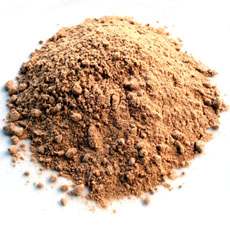Health Benefits of Guarana Seeds
By Irina Bright.
 Guarana powder.
Guarana powder.
Guarana (Paullinia cupana) is a plant that grows in the rainforests of Brazil and some other Amazon-Basin countries of South America.
It is famous for its fruit's seeds which have a strong stimulating effect on our bodies due to their high caffeine content, which is roughly 12.2mg caffeine per 1g of guarana. (Ref. 1)
We like to call guarana a wonder energiser plant for those who need a quick *pick-me-up* without unpleasant side effects of drinking coffee and artificial energy drinks.
Although guarana has caffeine as its main stimulating substance, anecdotal evidence suggests that it doesn't bring on a state of energy collapse a couple of hours after consuming it - the way that coffee may do.
In fact, taken in conjunction with some other whole foods ex. maca root and cacao powder in small amounts, it can bring long-lasting energising effects.
Many people use guarana specifically as an alternative to coffee, with positive results.
Treating tiredness and chronic fatigue may take some time for those of us who have just embarked on a journey to recovery.
So taking small amounts of guarana may help carry you through such periods of dealing with health issues.
It is nonetheless important to persist with your holistic therapy until it improves your energy levels naturally.
And once you achieve desirable results, feel free to continue taking guarana as this plant and its botanical compounds (ex., phenols, flavonoids and proanthocyanidins) have so much more to offer than just physical stimulation. (Ref. 2)
Guarana has been traditionally used in Latin America as an aphrodisiac, as well as to improve cognition and concentration levels, and to treat headaches, fever and all sorts of infections. (Ref. 3)
Guarana has also been suggested as an aide for weight loss thanks to its ability to suppress appetite, reduce fat tissue and generally improve the metabolic function of the body. (Ref. 4 and 5)
Guarana is nowadays widely added to energy drinks.
We don't recommend consuming energy drinks on a regular basis since they contain a lot of other ingredients that may be harmful to health.
Why not take the pure product and feel the naturally synergistic benefits of this plant instead?
Guarana has been used for centuries in Latin America and for many years in the rest of the world and has proven to be a safe plant.
Nonetheless, gurarana powder is not recommended if you have a pre-existing condition (ex. high blood pressure, heart disease or any other serious condition). Pregnant women and nursing mothers are advised to avoid this product as well.
Written by: Irina Bright
Original publication date: 2013
Updates: 2020
Republication date: 2020
References.
1. Bittencourt LS, Machado DC, Machado MM, Dos Santos GF, Algarve TD, Marinowic DR, Ribeiro EE, Soares FA, Barbisan F, Athayde ML, Cruz IB (2013). The protective effects of guaran extract (Paullinia cupana) on fibroblast NIH-3T3 cells exposed to sodium nitroprusside. Published in Food and chemical toxicology. Retrieved June 2, 2013 from: https://www.ncbi.nlm.nih.gov/pubmed/23220610
2. Jimoh FO, Sofidiya MO, Afolayan AJ (2007). Antioxidant properties of the methanol extracts from the leaves of Paullinia pinnata. Published in Journal of medicinal food. Retrieved June 2, 2013 from: https://www.ncbi.nlm.nih.gov/pubmed/18158845
3. Mrcio Rodrigues, Gilberto Alves, Nulita Loureno, and Amlcar Falco (2012). Herb-Drug Interaction of Paullinia cupana (Guarana) Seed Extract on the Pharmacokinetics of Amiodarone in Rats. Published in Evidence-Based Complementary and Alternative Medicine. Retrieved June 2, 2013 from: https://www.ncbi.nlm.nih.gov/pmc/articles/PMC3523151/
4. Rafael de Lima Portella, Rmulo Pillon Barcelos, Edovando Jos Flores da Rosa, Euler Esteves Ribeiro, Ivana Beatrice Mnica da Cruz, Leila Suleiman, and Felix Alexandre Antunes Soares (2013). Guaran (Paullinia cupana Kunth) effects on LDL oxidation in elderly people: an in vitro and in vivo study. Published in Lipids in Health and Disease. Retrieved June 2, 2013 from: https://www.ncbi.nlm.nih.gov/pmc/articles/PMC3599679/
5. Elida Bulku, Daniel Zinkovsky, Payal Patel, Vishal Javia, Tejas Lahoti, Inna Khodos, Sidney J Stohs, and Sidhartha D Ray (2010). A novel dietary supplement containing multiple phytochemicals and vitamins elevates hepatorenal and cardiac antioxidant enzymes in the absence of significant serum chemistry and genomic changes. Published in Oxidative Medicine and Cellular Longevity. Retrieved June 2, 2013 from: https://www.ncbi.nlm.nih.gov/pmc/articles/PMC2952097/